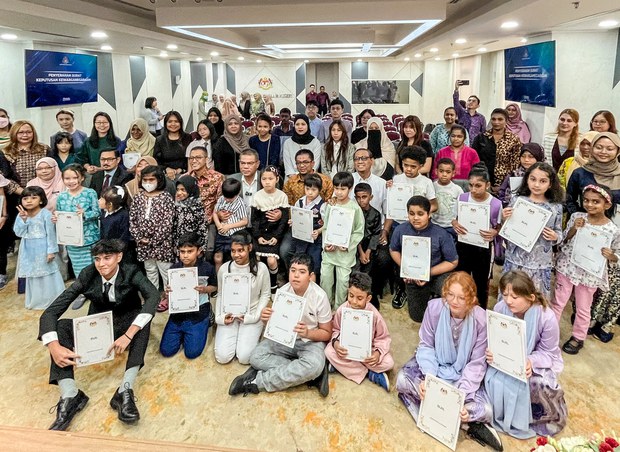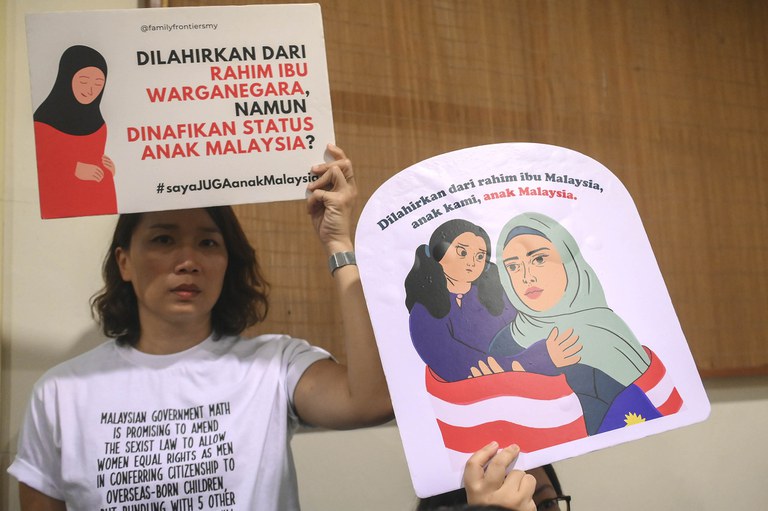Who wins, who loses from the changes to Malaysia’s citizenship laws?
2024.10.22
Kuala Lumpur
 Malaysian Home Affairs Minister Saifuddin Nasution (seated, wearing a gray jacket and holding two children) poses for a photo with some children born overseas to Malaysian mothers, as they hold citizenship approval letters at his ministry’s headquarters in Putrajaya, March 19, 2024.
Malaysian Home Affairs Minister Saifuddin Nasution (seated, wearing a gray jacket and holding two children) poses for a photo with some children born overseas to Malaysian mothers, as they hold citizenship approval letters at his ministry’s headquarters in Putrajaya, March 19, 2024.
Under a bill passed by Malaysia’s lower house last week, Malaysian mothers can transfer their citizenship to children born overseas – a right previously reserved only for Malaysian fathers.
The landmark change to the nation’s citizenship laws – as framed through several proposed constitutional amendments – is expected to sail through the upper house by year’s end. Once it receives royal approval, the bill will become law.
BenarNews looks at who wins and loses from the passage of the amendments, which are seen as a victory for women’s rights in the Southeast Asian country.
THE WINNERS:
Malaysian mothers with overseas-born children
Women in this category now have the right to pass citizenship onto their children born abroad. Because this right was previously and exclusively granted to Malaysian fathers, many mothers were left in protracted legal battles to secure citizenship for their children.
For years, some Malaysian moms endured years of uncertainty while waiting for citizenship applications of their children to be processed, human rights groups said.
“This amendment will significantly alleviate the emotional and bureaucratic burdens faced by countless Malaysian mothers who have long struggled with the uncertainty and stress of their children’s citizenship status,” said Adlyn Adam Teoh, president of Family Frontiers, a local rights advocacy group.
Citizenship applicants
The Malaysian government hopes the amendments will hopefully ease a backlog of thousands of citizenship applications.
“We processed over 19,000 applications this year alone, 80 percent of which had been pending for more than five years,” Home Minister Saifuddin Nasution Ismail told parliament.
Saifuddin called the bill’s passage in the lower house a “government’s victory” and pledged to resolve all pending citizenship applications by October next year.
THE LOSERS:
Children born to permanent residents
The amendments will revoke the automatic citizenship given to boys and girls who are born in Malaysia to permanent residents. Under the changes, these children will have to apply and register for citizenship.
This would also affect orphans and children born out of wedlock, said child rights activist Hartini Zainuddin.
“I have so many 16-, 17-, and 18-year-old orphans or children with Malaysian fathers who may or may not acknowledge them – children born out of wedlock or who don’t even know who their parents are,” she told BenarNews.
“The certainty and guarantees once provided [to these children] by the Constitution have been removed.”

Many permanent residents, including generations of individuals of Chinese and Indian origins, would be affected by the amendments, said Azrul Khalib, chief executive officer of local healthcare watchdog Galen Center.
They are not foreigners, but individuals who should be recognized as Malaysians, he said.
Marginalized communities
By revoking the automatic citizenship under the old laws, the bill would also affect people from indigenous communities, who have lived in the country for generations without official citizenship, critics said.
“These include indigenous communities of Orang Asli and Orang Asal in Peninsular and East Malaysia,” said Azrul. “These communities are among the most marginalized.”
These groups have lived in these regions for centuries, predating modern nation-state borders. However, according to Home Minister Saifuddin, the amendments would generally protect indigenous rights and state privileges.
Existing children of Malaysian mothers with overseas-born children
The new law would not apply retroactively. This means children from Malaysian mothers born overseas before the amendments were passed will not automatically gain citizenship.
This has left many families and critics disappointed.
“Unfortunately, for those who are older, they will miss the opportunity,” Sue Haina, a mother to a stateless child, told BenarNews.
Sue said for mothers like her, their children will need to apply for citizenship and wait for the approval of authorities to be recognized as Malaysian citizens.
Stateless children
Under the bill, the age limit for stateless children to apply for citizenship has been reduced from 21 to 18, effectively cutting the window period for their application.
The shortened period may prevent many stateless children from meeting the citizenship requirements in time, a process already known to take several years to complete, citizen groups said.
There are more than 16,000 stateless children in Malaysia, according to the nonprofit Development of Human Resources for Rural Areas.
Foreign spouses of Malaysian men
The bill introduces a provision enabling the government to revoke the citizenship of foreign spouses of Malaysian men if their marriage ends within two years of their citizenship application, rather than within two years of the marriage itself.
Critics argued that the bill could force women to remain in abusive or violent marriages, fearing the possibility of becoming stateless, as Malaysia does not permit dual citizenship.
RELATED STORIES
Malaysian minister says amended citizenship laws won’t render more children stateless
Malaysian cabinet agrees to amend citizenship law seen as discriminatory towards women
Court overturns ruling granting citizenship to children born outside Malaysia
Malaysian Mothers Win Landmark Case against Discriminatory Citizenship Law







